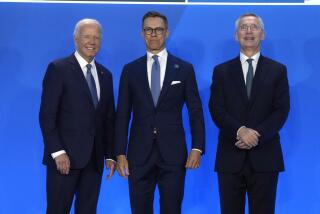U.S., Soviets OK Centers for Reducing Nuclear Risks
- Share via
GENEVA — The United States and the Soviet Union announced agreement Tuesday on establishing nuclear risk reduction centers in the first accord to emerge from the 1985 Geneva summit.
President Reagan and Soviet leader Mikhail S. Gorbachev agreed at that time on the need for establishing the centers to permit immediate explanations in case of misunderstandings that could lead to accidental nuclear conflict.
U.S. and Soviet delegates held confidential talks on the proposed centers in May and August of 1986, again in January and then for a fourth time on Sunday and Monday.
“There was a champagne celebration,” a Soviet delegate said. “It is the first agreement resulting from the Geneva summit. This shows that we can do business.”
In Washington, White House spokesman Marlin Fitzwater said, “The Administration welcomes this agreement as a practical measure that will reduce the risk of conflict between the United States and the Soviet Union, particularly nuclear conflict that might result from accident, misinterpretation or miscalculation.”
Neither side provided details because the draft agreement--along with two protocols--is being referred to Reagan and Gorbachev for final approval.
But State Department officials in Washington said the centers will be used to trade information on such things as nuclear tests or missile tests.
The original concept had Soviet officers serving in Washington and U.S. military officials working in Moscow. But the State Department said that military leaders on both sides objected, and the officers now will work in their own capitals while maintaining instant communication.
Under the arrangement, according to the State Department, the centers will not be used in the kind of crisis where the hot line is employed. The risk centers will only be used for routine operations, the officials said.
“The agreement is designed as a confidence-building measure,” an American spokesman said.
Perle at Talks
U.S. delegates to the negotiations were Assistant Secretary of Defense Richard N. Perle and special presidential assistant Robert B. Linhard, an Air Force colonel.
The Soviet chief delegate was Alexei A. Obukhov, who is also the deputy leader of the Soviet delegation at the main nuclear and space arms talks in Geneva.
At those talks, negotiators began new rounds of talks Tuesday on long-range nuclear weapons and on anti-missile defense systems in space--the eighth round since the talks began March 12, 1985.
In Washington on Monday, Reagan reaffirmed a proposal to reduce U.S. and Soviet strategic arms by 50% over a seven-year period. The proposal will be included in a draft treaty the United States will put on the table this week in Geneva.
The Soviet Union has linked cuts in long-range intercontinental arsenals to tight restrictions on the Strategic Defense Initiative, the U.S. space-based missile defense informally known as “Star Wars.”
More to Read
Sign up for Essential California
The most important California stories and recommendations in your inbox every morning.
You may occasionally receive promotional content from the Los Angeles Times.









